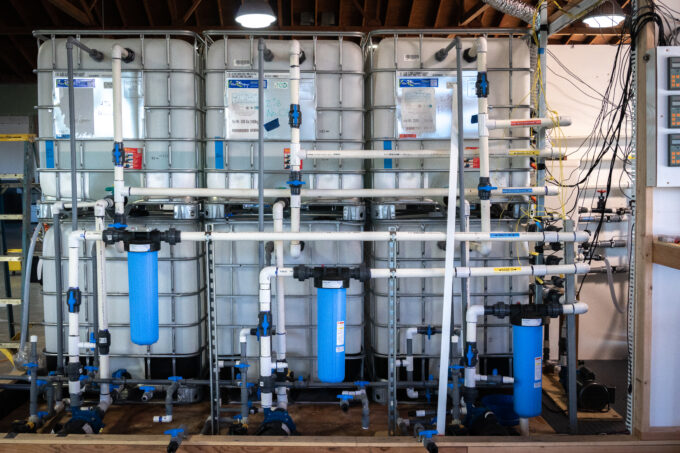Want to enhance natural carbon capture and storage? Look no further than our oceans.
Oceans are large carbon sinks, absorbing CO2 and using it to form bicarbonate—essentially, baking soda—that safely stores carbon for thousands of years. This makes oceans a powerful tool for fighting climate change. But this carbon removal process currently happens over millions of years, and is being hampered by climate change.
That’s where Ebb Carbon—a Greentown startup that not only restores oceans’ carbon capture capabilities, but actually speeds up the process to happen in a fraction of the time—comes in.
“The big idea behind Ebb Carbon is essentially using electrochemistry to accelerate what is already a natural process for regulating CO2 in the atmosphere,” says CEO and Co-founder Ben Tarbell.
Ebb Carbon has developed a proprietary electrochemical system that rearranges the salt and water molecules in salt water into acid and slightly alkaline saltwater solutions. Returning the alkaline salt water to the ocean creates a natural chemical reaction that pulls CO2 out of the air. Ebb’s approach also has the co-benefit of reducing ocean acidity–one of the biggest problems facing the ocean today. Its technology is modular and scalable, fitting inside a storage container, and its first installation is rated at 100 tons of carbon removal per year.
Over the next five years, the startup plans to deploy a megaton (1 million tons) of carbon removal systems, according to Tarbell, with a target cost of under $100 per ton of carbon capture. Its technology is scalable to tens of gigatons, he says.
Ebb Carbon caters to the growing market for voluntary carbon removal, particularly among corporations that have made climate commitments. Its first customer, Stripe, purchased $1.5M in carbon removal credits, according to Tarbell.
Even apart from carbon capture and storage, deacidifying the ocean is an impactful effort in of itself. “Ocean acidification is global warming’s forgotten crisis,” a Climate Home News article declares, and NOAA warns that it “could ultimately threaten a reorganization of the entire marine food chain.”
But Ebb Carbon isn’t going to stop at de-acidifying our oceans and enhancing their natural carbon capture abilities. It retains the acid it removes from salt waters, and in the future the startup intends to put that acid to work.
The retained acid can be used to capture additional carbon dioxide from the air by applying it to certain rocks, including basalt. When acid is applied to basalt, it partially dissolves the rock and increases the surface area of the rock that can capture atmospheric CO2 and store it in mineral form, according to the startup.
“It’s multiple orders of magnitude bigger than the climate problem, in terms of capacity, if we utilized all of the available basalt formations,” Tarbell says. “It’s a big opportunity for storing a lot of carbon dioxide.”
The startup will complete its first deployment this year, and intends to continue making improvements to its core technology that will lower its cost, lengthen maintenance cycles, and more. Its 12-person team is actively hiring.
Ebb Carbon came to Greentown Houston for its network and entrepreneurial community, according to Tarbell.
“We’ve certainly benefited from the job board and from connections to other like-minded co-founders and teams through the Greentown network,” he says.
Learn more about what our Houston incubator offers climatetech startups!


